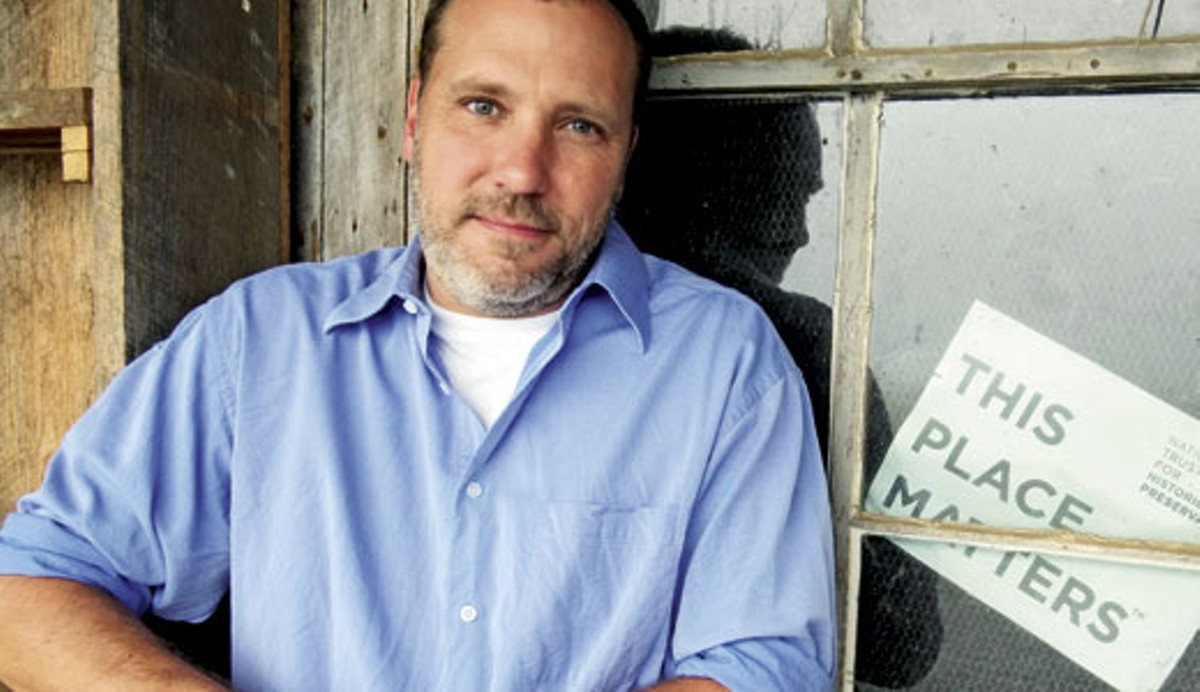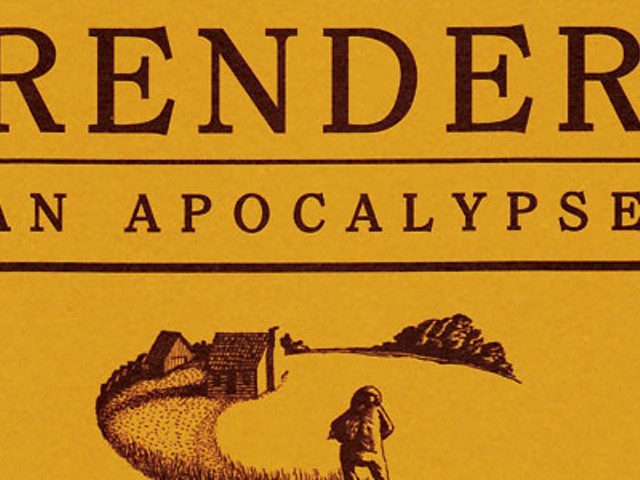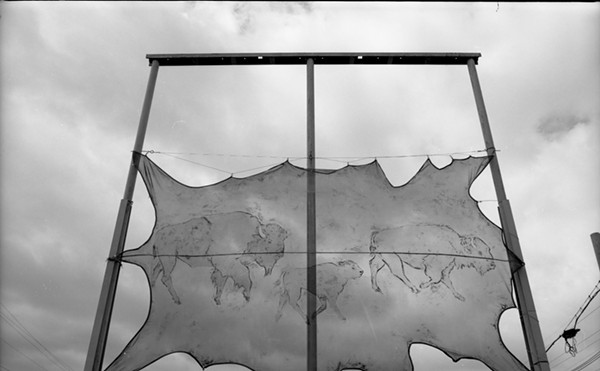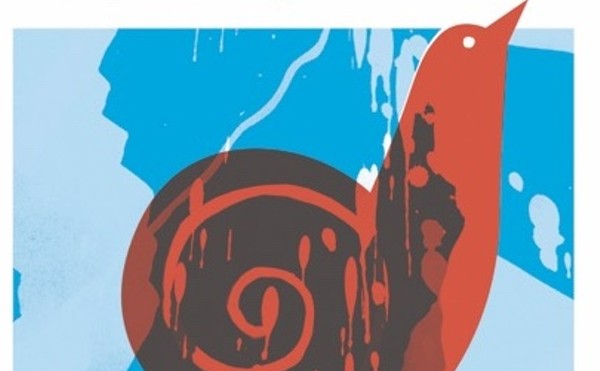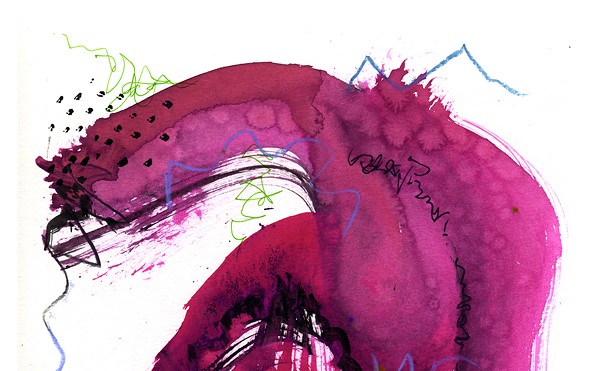When Maurice Manning was working his first job out of college in the early ’90s, he used to grab a cup of coffee most mornings at a little greasy spoon near the Centre College campus in Danville, Ky. There was always the usual gang of local, working-class men, chain-smoking their Marlboros at the counter in between bites of fried eggs and swigs of black coffee. But one morning Manning encountered an old guy sitting alone at a table, talking out loud to himself.
“At one point, he said, ‘Well, I got me a pretty good torque wrench the other day,” Manning says. “And he paused for a minute and said, ‘I believe I’ll go get it.’ And he walks out of the restaurant and comes back in with a torque wrench and sits it on the table in front him, and one guy at another table said, ‘Yeah, I remember having to put a motor in a truck a couple of years ago and I wish I’d had a torque wrench that nice.’ And it just kind of unintentionally started a number of people sharing their stories about torque wrenches.”
Manning pauses for a beat, then lets loose a contagious laugh about the experience. When it subsides, he turns serious once again. “I feel lucky that I was, for a good stretch of my life, in a position really to be the observer. I was so fascinated by this kind of ongoing story — it was more like I was there as a reader of the oral stories.”
But that was then. Now, in his career as internationally acclaimed poet — which has seen him publish four collections of poetry, including 2010’s “The Common Man,” one of three finalists for the Pulitzer Prize — the 47-year-old Manning is instead the keeper of these tales, the literary guardian of a way of life he feels is vanishing from small-town Kentucky and America. His most recent poetry collection, titled “The Gone and the Going Away” and due to be released April 23, maintains his fidelity to rural themes, recapturing a lost world for readers to remember and preserve.
Where/did all the old time people go?
Who’s hidden them away and why?
—“The Gone and the Going Away”
“The world I know keeps going farther/and farther away,” Manning writes in the opening lines of the collection’s title poem. “Perhaps I knew/this would happen,” he continues, “one world replaced by a later world/I don’t belong to.”
The landscape he conjures in “The Gone and the Going Away” is a mythical one, located in a corner of Kentucky called Fog Town Holler where the green waters of Shoestring Branch mark the lives of its people. Using an imaginary place provided Manning with a focal point for the collection. “Once I gave it a fictional place to happen, I then realized I had characters and could develop them,” he says, “and it kind of took on a theatrical quality as well. I began to think of poems like scenes in a play. And once I had established that structure, it really clarified the sense of the whole book.”
The residents of Fog Town Holler have “funny names.” There’s Mr. Key, Sylvanius Shade, and two farm brothers with a dog named Murdock who treed a woman up a pawpaw tree. Billy Oglesby “carried a pistol in his boot” and became convinced that his baby was possessed after he and his wife joined a Holy Roller church. Then there’s Agnes Caldwell, the “woe-bent digger/of mountain graves” who sings weary songs to herself.
These characters have roots in Manning’s childhood in Danville, Ky., where he noticed “folks … who just didn’t fit the mold.” He recalls, “They were their own independent people, and the community allowed them to be there. And I often say about people in small towns in Kentucky — I used to always think that the eccentric people were perfectly free to walk the streets and be who they (were), and it made for … an interesting cast of characters.”
Things have changed, though, and Manning says he feels an absence in small town Kentucky of what old-time rural folk often called “quare people” — a colloquialism referring to people who are considered different or weird. “I think that it is less noticeable today. There’s kind of been a smoothing out in the last 20 or 30 years — it’s as if the mainstream has swelled to such an extent that it’s just absorbed the oddballs.”
This loss, he believes, is directly related to the homogenization he sees taking place throughout the commonwealth, as well as the rest of the country. “At some point I realized … that the world I’m writing about is all but gone in that, in my lifetime, Danville’s character as a town seems to change, and it became less of an isolated town with its own quirks and eccentricities, which I always loved growing up.”
Although he is quick to note the progress that has been made in small Southern towns in the areas of poverty and race in recent decades, Manning laments the loss of the town square, where banks, dime stores and soda fountains used to be located. These centers have been replaced with what he terms “the strip-mall version of so-called economic development,” the cornerstone of which is Wal-Mart, with sprawling shopping centers scattered on the perimeters of towns.
“There’s got to be something wrong with that model,” he says, ticking off a lengthy list of negative effects. But the primary injury of this homogenization, Manning believes, is one that goes to the heart of America’s social structure. “The small rural communities, in my observation at least … allowed for a different kind of democracy to be in place. And I’m not saying that it’s necessarily a better form of democracy, but this is something that I would say is a longstanding characteristic of the South, is that you have rich people living side-by-side with people who are not wealthy. You can see a big, fine home next to a little, falling-down, humble house, and I think people of different economic (statuses) saw each other (then). They weren’t physically separated from each other the way our communities are now, where you’ve got a semi-exclusive new housing development out on the edge of town, and those folks drive in and out of their big homes … and don’t really have much to do with the elderly person living in the little house in town.”
Manning experienced such interactions across social classes when he worked at the old hardware store in downtown Danville, long since relocated from Main Street to a strip mall. There, in aisle after aisle of nails and screws and sockets, he witnessed a level playing field, where lawyers were waited on alongside carpenters and teachers, with scenes unfolding that impacted his writing. “I think it exposed me to just a range of people, and it allowed me to feel comfortable with just about anybody. I enjoyed that, and I especially enjoyed how people interacted with each other in a kind of ongoing storytelling fashion.”
That way of life, he says, is hard to find nowadays.
They should have taught us birds and trees?
in school, they should have taught us beauty?
and weaving bees and had a class
on listening and standing alone
—“The Fog Town School of Thought”
For many years now, Manning has called a clapboard farmhouse in rural Washington County home. Tucked away in the south end of the county, east of Springfield, the house sits on a 20-acre piece of land that is meant to be walked. Out behind the gardens — a small one planted with basic kitchen vegetables, another bigger and more diverse — Manning has allowed the grass and brush to grow wild. He has mown a walking path through that wilderness, one that meanders and lends itself to contemplation. He walks it every day, sometimes alone, other times with his wife Amanda, his passel of dogs trailing close behind — Cap, with his steady gait; Buddy, a lab mix with buttermilk fur; Larry, a brown-and-white hound with a kind, intent gaze.
Living in Washington County is a spiritual act, Manning says, one that offers countless rewards and hardships alike. “I’m a stubborn person when you get down to it,” he laughs. “For some reason, I like doing everything the hard way. And so living where we live and in the ways that we live, we do without certain things that are considered modern comforts.”
But there is a political element to Manning’s decision to live in the country as well, and his voice thickens with emotion when talking about it. “I feel that the life that rural Americans lived a generation ago and before kind of got put down, and people were led to believe that the kind of life they had was of less value and not modern enough, not slick enough, not polished enough, not material enough. I guess I feel that there is a richness in rural life that even rural people have failed to value. I think there’s plenty, plenty to value right here. And I think somebody needs to stay put and enjoy the richness and challenges of rural life.”
Manning savors much of his bucolic life through music. A longtime guitar player — who is known among his friends to offer a mean rendition of Nick Lowe’s version of “True Love Travels on a Gravel Road” — he has recently begun taking banjo lessons from fellow Washington County resident Sue Massek, a celebrated old-time musician known for her solo work and tenure with the Reel World String Band.
“I would give myself a C as a banjo student,” he laughs. “I love it and love the experience of knowing Sue.” Although he has found his lessons enlightening, Manning says his interaction with Massek is just as educational. “Our lesson would begin with Sue telling a story about an old-time musician that she knew, and she learned this song from so-and-so, and that was just as important if not more so than learning a few licks on the banjo.”
Every little cluck and pop he produces on the banjo conjures the past, a memory of a way of life that seems to live on in his DNA. This love of rural culture and land, he says, is “an innate, instinctive thing.” During his years on faculty at Indiana University in Bloomington, Manning would dream of his land in Washington County, making the three-hour drive as often as he could during the summer or on breaks throughout the semester. When he was awarded the prestigious Guggenheim Fellowship in 2011, he moved to the farm full-time, becoming a permanent resident at long last when he was hired the following year by Transylvania University in Lexington. He commutes to the city to teach two days a week, writing from home the rest of the time, a relief from his previous exile.
“I would write poems sitting in Indiana,” he recalls, “but they were always poems about Kentucky. When I close my eyes, the landscape that is in my mind is a Kentucky landscape. And I can’t replace it with any other landscape.”
Manning muses aloud about one of his literary heroes, fellow Kentuckian and three-time Pulitzer Prize winner Robert Penn Warren, who himself could not escape the physical and cultural terrain of the commonwealth. “Warren is a writer that I feel very close to. I think of the 10 or 12 novels that he wrote, only ‘All the King’s Men’ is not set in Kentucky. And his poetry — the poems of his that I find most mesmerizing are definitely set in Kentucky. He wrote so much about a past world, and … was so interested in Kentucky history and the dark side of Kentucky history.”
The latter is a subject that Manning himself has turned to of late in criticizing mountaintop removal mining, which he feels is ravaging Appalachia. He addressed the subject — and more broadly, how the term “conservative” has all but lost its original meaning — in a widely praised op-ed in The New York Times last fall. Such acts of literary protest are an essential function of art, he believes.
“My orientation to being an artist is I think art is a way to create justice, especially when there (are) no other means for that justice to come to be. We have technical tools of the trade that are intrinsically justice-creating tools, like a simile or metaphor — you have to make an analogy of one thing to another, and when the simile or the metaphor is effective or clarifying, then I think in its own way it has a sense of observing an unjust situation and setting it right.”
This was the first time I heard the story
I was born to tell, the first I knew
that I was in the story, too.
—“Moonshine”
When he was a young poet, reading everything he could and just beginning to try his hand at the craft, Manning was taken in by an older group of Kentucky writers who saw in him what he was not yet able to see — that he had an extraordinary gift, one that would bring him to represent his native state on the national stage. Award-winning novelist Bobbie Ann Mason and her husband Roger Rawlings, along with the late poet James Baker Hall and his wife, novelist Mary Ann Taylor-Hall, took Manning on as their “adopted literary son,” letting him tag along with them to readings and other literary events.
One such occasion took place at the volunteer fire department in Monterey, Ky., population 164, in 1992. Hall was there to read from his poetry collection “Fast Signing Mute,” published by Larkspur Press, the famous letterpress located in Monterey. There, sitting on a metal folding chair on a gravel floor, Manning saw a flash of his future.
“It was as cold as the dickens,” he remembers, “and Jim stood up there and read his poems to about eight people, and I just thought, ‘This is what the literary life is.’ You know, it’s not hanging around at a cocktail party. This is bringing it to the people and the people want it wherever it’s going to be, and it happened to be at the Monterey Fire Department. I’ve often thought that that was just a great demonstration of art whose outcome isn’t commerce. It’s art whose outcome is community.”
Although Manning has been lauded throughout the country for his work — garnering accolades from some of the major poets of our time, like W.S. Merwin, in addition to the numerous awards he has received — he has found his place in this literary life, wearing it now as effortlessly as the patterned chambray shirts he favors. He is a man of the people, intent on bringing poetry and scenes of rural beauty to them, words of the past, but also the present — the poetry of preservation, of all of us.
Jason Howard is the author of “A Few Honest Words: The Kentucky Roots of Popular Music.” His work has been featured in The New York Times, the Nation, Paste, Sojourners, and on NPR.

